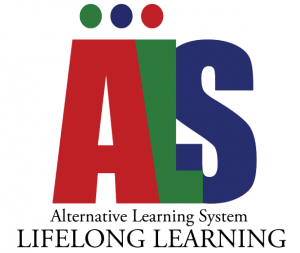- Alternative Learning System (als) Approach
- Alternative Learning System (als) Student
- Alternative Learning System Modules
- Alternative Learning System (als)
UNESCO Office, Jakarta in collaboration with the Philippines’ Department of Education (DepEd) and the Asia Pacific College (APC) organized the second workshop on a series of eight workshops in the Development of the Alternative Learning System (ALS) Learning Materials in Tagaytay City, Cavite, Philippines on 25-27 September 2019.
ALTERNATIVE LEARNING SYSTEMS India's largest IAS coaching network ALS is India's Premier institution established with the sole aim to initiate, enable and empower individuals to grow up to be. MANILA, Philippines — A child rights advocacy group has lauded the enactment of the Alternative Learning System (ALS) Act, which they said is a step towards achieving inclusivity of education, especially for vulnerable sectors and amid the COVID-19 pandemic. What is Alternative Learning System or ALS? It is a parallel learning system in the Philippines that provides a practical option to the existing formal instruction. When one does not have or cannot access formal education in schools, ALS is an alternate or substitute. ALS includes both the non-formal and informal sources of knowledge and skills.
This is the second workshop of the Development of the New ALSs Modules following the first one held in August 2019 on the Mapping and Tagging of Alternative Learning Resources for Alternative Learning System Equivalent to K-12 Basic Education. The development of the ALS learning materials is one of the five key components of the project of UNESCO Office, Jakarta called the “Better Life for Out-of-School Girls to Fight Against Poverty and Injustice in the Philippines” with funding support from the Korea International Cooperation Agency (KOICA).
The main objective of the second workshop is to present the draft of new ALS modules developed by content writers, content experts and illustrators for the seven learning strands of ALS curriculum parallel to K-12 basic formal education. Participants to this workshop includes content writers, content experts, language and gender experts, multimedia experts and curriculum consultant together with APC project team, DepEd ALS Task Force and UNESCO. Around 40 participants attended the workshop where inputs and comments were provided to the draft of new ALS modules. Based on the feedback during the workshop, the content writers and experts shall revise their modules per learning strand and finalize the modules based on the standard criteria of DepEd for the development of ALS learning materials. Expert inputs in the development of ALS modules were further provided to level off understanding of content writers and experts of the unique characteristics of an ALS module compared to formal education learning modules.
Under this component of developing the new ALS modules, it is envisaged that 50 new ALS modules shall be developed within the seven learning strands for ALS under the enhanced curriculum. The project team lead of the workshop, Ms. Mildred Pardo, delivered the introductory remarks and briefing regarding the agenda and dynamics of the 3-day workshop. On behalf of UNESCO Jakarta, Mr Remegio Alquitran, UNESCO National Project Officer, provided short remarks in extending its sincere appreciation to all participants specifically to DepEd and APC in their collaboration for the project.
Once all the draft ALS modules are finalized, there will be a validation process in the field which will be conducted in October 2019.
What is Alternative Learning System or ALS?
It is a parallel learning system in the Philippines that provides a practical option to the existing formal instruction. When one does not have or cannot access formal education in schools, ALS is an alternate or substitute. ALS includes both the non-formal and informal sources of knowledge and skills.
Why is there a need for Alternative Learning System in the Philippines?
Many Filipinos do not have a chance to attend and finish formal basic education (Grades 1-6 and Year 1-4) due to many reasons. Some drop out from schools while some do not have schools in their communities. Since every Filipino has a right to free basic education, the Government establishes ALS to provide all Filipinos the chance to have access to and complete basic education in a mode that fits their distinct situations and needs.
What is the basis of ALS implementation in the Philippines?
Alternative Learning System (als) Approach
The 1987 Philippine Constitution provides for the recognition and promotion of other forms of education other than formal education. Article XIV, Section 2, Paragraph (1) declares that the State shall establish, maintain and support a complete, adequate and integrated system of education relevant to the needs of the people and society; and paragraph (4) concisely encourages non-formal, informal and indigenous learning systems as well as self-learning, independent and out-of-school study programs particularly those that respond to community needs.
Alternative Learning System (als) Student

The Governance Act for Basic Education otherwise known as the Republic Act 9155 stipulates the establishment of the Alternative Learning System (ALS) to provide out-of-school children, youth and adults population with basic education.
How does ALS work?
There are two major programs on ALS that are being implemented by the Department of Education, through the Bureau of Alternative Learning System (BALS). One is the Basic Literacy Program and the other is the Continuing Education Program – Accreditation and Equivalency (A&E). Both programs are modular and flexible. This means that learning can take place anytime and any place, depending on the convenience and availability of the learners.
Alternative Learning System Modules
What is the difference between the Formal Education System and the Alternative Learning System (ALS) Non-formal Education?
Alternative Learning System (als)
Formal Education system is classroom-based, managed by trained formal school teachers.
ALS Non-formal Education happens outside the classroom, community-based, usually conducted at community learning centers, barangay multi-purpose hall, libraries or at home, managed by ALS learning facilitators, such as mobile teachers, district ALS Coordinators, instructional managers at an agreed schedule and venue between the learners and facilitators.
